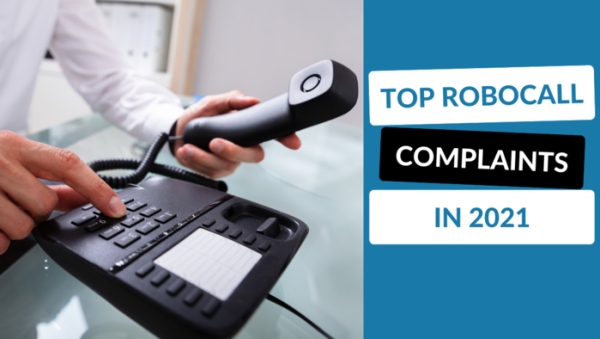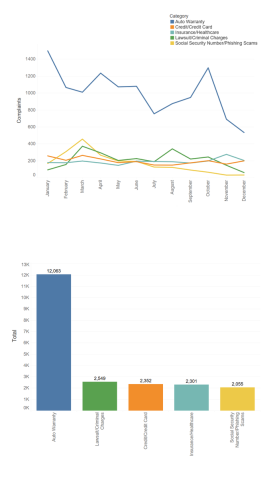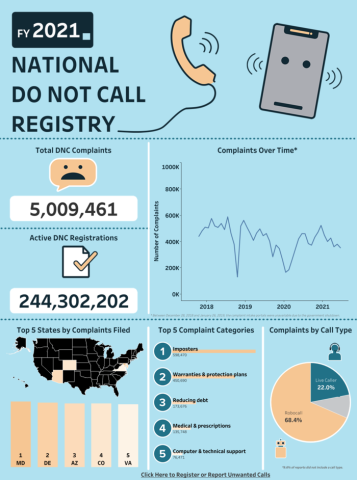
Wilmington, Delaware, USA – CPR Call Blocker reports the top five robocall complaints in 2021 and how they affected the US community.
Calls about warranties and protection plans are the most common unwanted calls consumers report receiving, followed by calls from phoney businesses or government agencies.
And according to the Federal Communications Commission (FCC), the top robocall complaint filed by consumers is Auto Warranty Scam. Most reports mention that the unwanted call begins with an automated or pre-recorded message that may instruct you to press a specific number or stay on the line.
These are the top five robocall complaints in 2021:
[Source: https://www.fcc.gov/data-spotlight-top-robocall-complaints-2021]
- Auto Warranty
- Lawsuit / Criminal Charges
- Credit / Credit Card
- Insurance / Healthcare
- Social Security Number / Phishing Scams

1. Auto Warranty Robocalls
Auto warranty renewal calls were customers’ most common robocall complaint lodged with the FCC in 2021 for the second year. While the total number of complaints filed with the FCC concerning vehicle warranty scams increased from nearly 7,600 in 2020 to more than 12,000 in 2021, complaints decreased in the last months of the year.
These robocalls offer you to renew your car warranty or insurance policy. To make Them have obtained information on your car and its current warranty. They provide to appear more believable and frequently include precise information about your vehicle and warranties, making the call appear more authentic.
2. Lawsuit or Criminal Charges Scam Calls
In the second place is the lawsuit or criminal charges scam calls. Callers pretend as local law police and claim to have a warrant for your arrest because you failed to appear for jury duty. They may ask you to pay a fee by wire transfer or gift card.
3. Credit or Credit Card Scam Calls
In the third place are the credit card scam calls. Scammers impersonating banks and credit card firms employ various techniques, such as false fraud warnings and promises of reduced interest rates, to steal your personal information and credit.
4. Insurance Scam Calls or Healthcare Robocalls
In fourth place are the insurance scam calls.
Scammers call offering reduced bogus health care coverage. Spoofing is occasionally used to impersonate government authorities or insurance firms. Frequently, they sell medical discount cards that are ultimately not accepted anyplace. Although fraudulent solicitations occur throughout the year, be especially careful during open enrollment.
5. Social Security Number Scam Calls
Social security number scam calls, the second most complained about robocall scams in 2020, dropped to fifth place last year, with complaints plummeting by nearly 60%.
Scammers may act as government officials, typically from the Social Security Administration, and want your Social Security Number or a payment. Occasionally, they will claim your SSN is suspended. It is possible that the caller is impersonating the Social Security Administration.
Top 5 States by Complaint Filed
The Federal Trade Commission (FTC) received 3.4 million complaints about robocalls in 2021, an increase from 2.8 million in 2020. Over 5 million consumers reported receiving unwanted telemarketing calls in FY 2021, up from almost 4 million in FY 2020. 22% of those complaints were about live telemarketing, while 68% were about robocalls.
The National Do Not Call Registry Data Book for Fiscal Year 2021 was made public by the FTC. The National Do Not Call Registry received nearly 3 million registrations during the previous fiscal year, bringing the total to almost 245 million phone numbers.
In FY 2021, the states reporting the most complaints per 100,000 population changed: Maryland (2,028 per 100K population), Delaware (1,982 per 100K population), Arizona (1,945 per 100K population), Colorado (1,943 per 100K population), and Virginia were the top five (1,939 per 100K population).
1. Maryland
The top state when it comes to complaints filed is Maryland. It’s reported that there are 122,595 complaints filed. There were 84,552 robocalls reported with imposters and warranties as the top type of scam call complaint.
2. Delaware
The top second state when it comes to complaints filed is Delaware. It’s reported that there are 19,302 complaints filed. There were 12,264 robocalls reported with imposters and warranties as the top type of scam call complaint.
3. Arizona
The top third state when it comes to complaints filed is Arizona. It’s reported that there are 141,543 complaints filed. There were 90,612 robocalls reported with imposters and warranties as the top type of scam call complaint.
4. Colorado
The fourth top state when it comes to complaints filed is Colorado. It’s reported that there are 111,866 complaints filed. There were 77,484 robocalls reported with warranties as the top type of scam call complaint.
5. Virginia
The fifth state when it comes to complaints filed is Virginia. It’s reported that there are 165,508 complaints filed. There were 116,837 robocalls reported with imposters and warranties as the top type of scam call complaint.
How Does a Robocall Affect Financial Losses?
According to the FTC Report, out of 2.8 million frauds, 25% reported a loss. It is equivalent to a $5.9 billion total fraud loss with a median of $500.

It is also reported that out of the total fraud for 2021, 36% came from robocalls and phone calls. Out of all the fraud calls, 9% reported dollar loss, amounting to $692 million, with $1,200 as a median loss.

Additional Robocall Statistics for FTC 2021 Report Highlight
The Data Book offers a comprehensive state-by-state analysis, the most recent fiscal year data on robocall complaints, and the types of calls consumers reported to the FTC.

Here are the details of the report:
- Over 5 million consumers reported receiving unwanted telemarketing calls in FY 2021, up from almost 4 million in 2020. 22%of those complaints were about live telemarketing, while 68% were about robocalls.
- According to the Data Book, almost 594,000 complaints about imposter calls, including both live calls and robocalls, were received during the fiscal year that ended on September 30, 2021.
- According to the Commission, robocall complaints increased to 3.4 million in 2021 from 2.8 million in 2020. As a result of the significant decline in 2020, the total for 2021 is in line with prior years.
- The majority of consumer complaints about DNC violations for each month of the fiscal year were related to robocalls, which are defined by FTC regulations as calls that play a prerecorded message, with the highest number — 347,000 — occurring in March of this year.
- With more than 496,000 complaints, imposters were once again the subject of the most reported robocalls by consumers. With more than 412,000 robocall complaints from consumers, warranties and protection plans were the second most frequently reported topic.
- The third most frequently reported topic on calls was supposed debt reduction, followed by issues with prescription drugs, health care, and computer and technical support.
The infographic supplied by the FCC shows the data of the robocall scam complaints. The data in the report is publicly available on the FTC website.
How to Avoid Robocalls?
Most reports we receive state that unsolicited contact begins with an automated or prerecorded message instructing you to hit a specific number or stay on the line. Follow these best tips to avoid robocall scams.
You should not answer calls from unknown numbers. If you do this by accident, hang up immediately. Never give out personal or financial information to a caller. Always exercise care if you are under pressure to provide information or money.
Register Your Number to the Do Not Call List
You can register your phone numbers for free on the federal Do Not Call list. To register, you must dial the desired phone number. Additionally, you can sign up at donotcall.gov, where you can add your individual wireless phone number to the national Do-Not-Call list.
Consider Call Blockers Like CPR Call Blocker
Consider getting a call blocker like CPR Call Blocker to prevent robocalls and scam calls. The way a call blocker works is by identifying the phone numbers you’ve blocked. Usually, you attach one of these little boxes to your phone.
Some devices use databases of well-known scammers’ phone numbers, but you can add numbers you want to be blocked. The creation and maintenance of your own list of numbers to block are required by other devices.
For example, the CPR Call Blocker V100K for landlines has been preloaded with 100,000 of the most harmful robocall numbers reported to the FCC. This can significantly reduce robocalls, scam calls, political calls, election calls and general nuisance calls once the call blocker is connected.
Media Contact
Company Name: CPR Global Tech LLC
Contact Person: Chelsea Davies
Email: Send Email
Country: United States
Website: https://www.callblockerusa.com/
